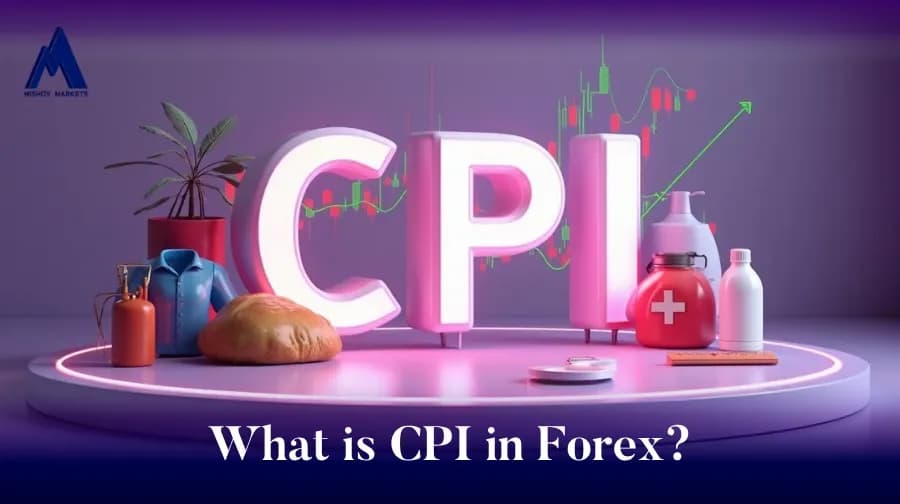What is CPI in forex

CPI in forex trading is critical; it affects the currency immediately and, in some cases, compellingly. To better understand its meaning, let’s visit Econville and listen to what Dr. Mishov has to say. Once upon a time in the bustling city of Econville, there was a wise and respected economist named Dr. Mishov. He was well-known for his profound understanding of the economy and his ability to explain complex ideas in simple ways that everyone could understand. One day, the citizens of Econville were concerned about the rising prices of goods and services, and they didn't understand why their money didn’t seem to stretch as far as it used to.
The town’s mayor invited Dr. Mishov to the town square to explain what was happening. Dr. Mishov, with his gray hair and thoughtful demeanor, stood in front of the crowd and began to speak:
"Citizens of Econville, the price changes you're observing are due to a phenomenon known as inflation." But to understand inflation, we first need to talk about a tool that we use to measure it. This tool is called the Consumer Price Index, or CPI."
The crowd looked intrigued but puzzled, so Dr. Mishov continued with a story.
"Imagine," he said, "a basket. This basket is filled with all the goods and services that the average family in Econville buys regularly—things like bread, milk, eggs, rent, gas, clothes, and even movie tickets for when you want to enjoy a night out. This basket doesn’t contain every single item that exists, but it represents the typical things you buy in your daily life."
The crowd nodded, picturing the basket.
"Now," Dr. Mishov explained, "every month, we track how much it costs to buy everything in that basket. We carefully watch if the price of bread goes up, if rent increases, or if the price of movie tickets goes down. This tracking gives us the CPI—the average price of the items in the basket. When we compare this month’s CPI to last month’s or last year’s CPI, we can see if prices are rising or falling overall."
The components of this basket are:
1. Food (14% of total weight)
2. Energy (8%)
3. Commodities without Food & Energy (21%).
4. Services, excluding energy. (57%)
These services are:
-
Shelter (32%)
-
Medical Care Services (7%)
-
Transportation Services (6%)
One of the citizens, a baker named Lena, raised her hand. "So if the CPI goes up, does that mean I’m paying more for everything in my life?"
Dr. Mishov smiled. "Good question, Lena. Yes, if the CPI goes up, it usually means prices are rising on average, and that's what we call inflation. It doesn’t mean that every single item in your basket is more expensive, though. For instance, gas prices may rise while bread prices stay the same or drop. The CPI gives us the average change in prices, but the costs of individual items can still vary."
At this point, a shopkeeper named Mark chimed in. "But Dr. Mishov, what causes the prices in the basket to go up?"
Dr. Mishov paused to consider and then said, "There are many reasons for this, Mark. Occasionally, it's because the cost of producing goods has gone up. For instance, if there's a shortage of wheat, the price of bread will rise. At other times, inflation occurs because the demand for goods and services exceeds the supply, which drives prices higher. And sometimes, inflation can happen if the government prints more money, which makes each unit of currency worth a bit less."
Mark nodded thoughtfully, understanding the connection between the economy and the prices he sees in his store.
Dr. Mishov went on, "It’s important to understand that inflation isn't always a negative thing. In fact, a little bit of inflation is normal and can be a sign of a growing economy. But if inflation gets too high, it can make life difficult for everyone, especially those whose wages aren’t rising as fast as prices."
Then a young student, Emily, asked, "What happens if the CPI goes down?"
Dr. Mishov answered, "Ah, that’s called deflation, Emily. Deflation means that prices are falling. While it might sound beneficial because things are getting cheaper, it can actually be dangerous for the economy. If people expect prices to keep falling, they might delay spending, thinking they'll get a better deal later. Such behavior can slow down economic growth and even lead to job losses."
Emily looked surprised. "So falling prices aren’t always a good thing?"
"Exactly," Dr. Mishov said. "It’s a delicate balance."
Dr. Mishov finished his explanation with a final thought. "The CPI is like a thermometer for the economy. Just as you’d take your temperature to see if you have a fever, we use the CPI to measure the health of our economy. If it rises too fast, it could be a sign of trouble. If it falls too quickly, that could also signal problems. That’s why economists, governments, and central banks watch the CPI closely to make decisions about things like interest rates and economic policies."
The citizens of Econville now understood the mysterious CPI. Thanks to Dr. Mishov’s wise explanation, they realized that the ups and downs of prices weren’t random but part of a much larger system. And as they walked back to their daily lives, they knew that the CPI would always help them keep track of how the economy was changing, one basket of goods at a time.






